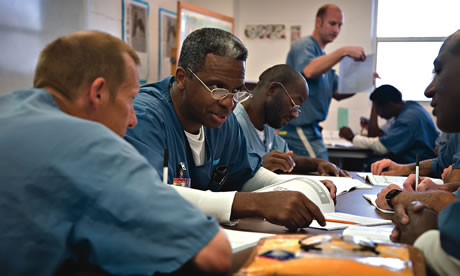SHARE:
Prison Reform: A Course Correction
With prisons full and a tight state budget, Florida business leaders are pushing reform as a matter of efficiency -- and public safety.
 Money Management: Convict Darryl Simpson teaches credit and debt management to other inmates at Wakulla Correctional Institution. [Photo: Jeffrey Camp] |
McNeil is not the first state official to push reform. Under former Gov. Jeb Bush, Florida made Lawtey Correctional Institution the nation’s first faith-based facility in 2003. Hillsborough Correctional Institution, a facility for women, became faith-based in 2004. The Glades Correctional facility becomes faith-based in May. Wakulla, since converting to a faith-based institution in 2006, has become the world’s largest, attracting keen interest from inmates — more than 5,000 are on a waiting list seeking transfers there.
Average Florida Inmate as of June 30, 2008 |
|
| 98,192 | Florida’s inmate population |
| 93% |
are male |
| 49.8% |
are black |
| 39% |
are white |
| 10.6% |
are Hispanic |
| 36.9 |
average age |
| 6.9 |
average grade level |
| 14.3 | years average sentence |
A 2007 Urban Institute study found six-month recidivism rates for Lawtey and Hillsborough inmates significantly lower than those for inmates outside the faith-based programs. Initial recidivism rates for Wakulla inmates — the Wakulla population includes more who serve time for serious offenses — are reportedly less than 10%, but DOC officials say the data are incomplete and can’t be compared conclusively against figures showing 32.8% of inmates statewide are back in the system within three years. The DOC says it will release figures on the long-term recidivism rates of Lawtey inmates later this year.
Despite the programs’ popularity and the intitial anecdotal and statistical results showing promise, Florida’s politicians have remained wary of reform efforts, equating reform with being soft on crime. But a new voice is pushing an overhaul of the system over the next few years: The state’s business community. “Our members make up one of the largest providers of tax revenues in the state of Florida, and we are funding a system that ensures people will recidivate, and that is a waste of our money,” says Barney Bishop, president of Associated Industries of Florida.
AIF, the Florida Chamber and TaxWatch have all warned that the state’s prison population is out of control. Between 2004 and 2008, the population shot up from just under 82,000 inmates to more than 100,000, in part because of the Legislature’s tough stance on crime in the 1990s, when Gov. Charlie Crist earned the moniker “Chain-Gang Charlie” as a state senator. In response to high-profile crimes, Florida lawmakers abolished gain time, which allowed inmates to shave time off their sentences with good behavior. They required that all prisoners serve 85% of their sentence regardless of crime and mandated prison time for even minor violations of probation.
The policies keep criminals off the street in the short run, but the state is learning there are financial limits. Florida now spends nearly $3 billion a year on corrections, more than it allocates to the state’s universities. Amid the current budget crisis, the DOC faces the same financial pressures as other state agencies. Corrections officials say unless Florida can lower its recidivism rate, the state must build 20 prisons — at $100 million each — to make room for new inmates and ex-cons who revolve back into the system.
Other states facing similar pressures, including traditionally conservative Kansas and Texas, have saved hundreds of millions of dollars by shifting money from new beds to community re-entry and rehabilitation programs — without seeing an increase in crime. Florida’s corrections culture has been slower to change. Last year, for example, the Council of State Governments sought an invitation to make Florida a learning site for its Justice Reinvestment project and got supportive letters from Crist and then-Senate President Ken Pruitt. But Marco Rubio, House Speaker at the time, warned in a letter that “there are certain policy options that the House does not wish to explore and will not support,” from any form of gain time to any extension of prison confinement to community-based programs.























